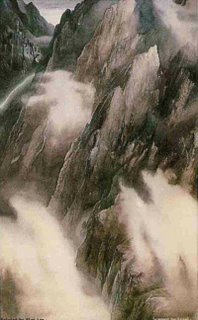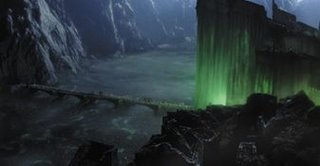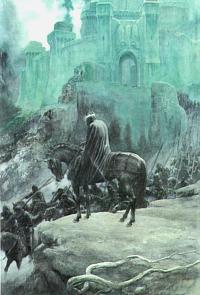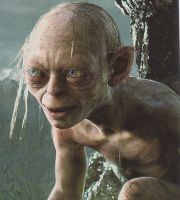TTT: Bk 4, Ch 8
"Sam groaned. 'Longer, did you say?' he asked.
'Yes, yess, longer,' said Gollum. 'But not so difficult. Hobbits have climbed the Straight Stair. Next comes the Winding Stair.'
'And what after that?' said Sam.
'We shall see,' said Gollum softly. 'O yes, we shall see!'"
 Now Frodo's brief detour had come to an end. Again, he and Sam found themselves staring into danger, looming before them in the form of the Mountains of Shadow. The burden of the Ring begins once more to drag him down. It's as if he now feels its weight grow heavier being so much closer to Mordor. They enter the cleft in the mountain range that is the known as the Morgul Vale. Off in the distance they see the walls and tower of Minas Morgul, the City of the Ringwraiths. Though it is dark all around, there is a sickly light emanating from within.
Now Frodo's brief detour had come to an end. Again, he and Sam found themselves staring into danger, looming before them in the form of the Mountains of Shadow. The burden of the Ring begins once more to drag him down. It's as if he now feels its weight grow heavier being so much closer to Mordor. They enter the cleft in the mountain range that is the known as the Morgul Vale. Off in the distance they see the walls and tower of Minas Morgul, the City of the Ringwraiths. Though it is dark all around, there is a sickly light emanating from within.
"Not the imprisoned moonlight welling through the walls of Minas Ithil long ago, Tower of the Moon, fair and radiant in the hollow of the hills. Paler indeed than the moon ailing in some slow eclipse was the light of it now, wavering and blowing like a noisome exhalation of decay, a corpse-light, a light that illuminated nothing. In the walls and tower windows showed, like countless black holes looking inward into emptiness; but the topmost course of the tower revolved slowly, first one way and then another, a huge ghostly head leering into the night."
 The Morgulduin flowed out of the Vale in front of the city, which was connected to the road by a long white bridge. As they approached it, Frodo felt a force working upon his will, urging him forward to go across the bridge. Sam and Smeagol had to struggle to pull him back. For their journey took a different direction. There was a gap in the stone wall beside the road. They climbed a narrow path that led up along the cliffs, and up the sheer southward face of the mountain. Wearily they climbed. Suddenly there was a great tremor echoing in the mountains. A red flash came from inside Mordor, followed by a loud crack of thunder. The tower of Barad-dur was letting loose a signal.
The Morgulduin flowed out of the Vale in front of the city, which was connected to the road by a long white bridge. As they approached it, Frodo felt a force working upon his will, urging him forward to go across the bridge. Sam and Smeagol had to struggle to pull him back. For their journey took a different direction. There was a gap in the stone wall beside the road. They climbed a narrow path that led up along the cliffs, and up the sheer southward face of the mountain. Wearily they climbed. Suddenly there was a great tremor echoing in the mountains. A red flash came from inside Mordor, followed by a loud crack of thunder. The tower of Barad-dur was letting loose a signal. "And Minas Morgul answered. There was a flare of livid lightnings: forks of blue flame springing up from the tower and from the encircling hills into the sullen clouds. The earth groaned; and out of the city there came a cry. Mingled with harsh high voices as of birds of prey, and the shrill neighing of horses wild with rage and fear, there came a rending screech, shivering, rising swiftly to a piercing pitch beyond the range of hearing. The hobbits wheeled round towards it, and cast themselves down, holding their hands upon their ears."It was the shrill call of the Nazgul. The gates of the city opened and a great army marched out swiftly to war. Leading them was the Witch-King, the Lord of the Ringwraiths, wearing a crown upon his hooded head. The old wound in Frodo's shoulder that was inflicted by this evil being throbbed with pain.
 Frodo feared that now he was too late and hoped that Faramir and his men would make it back at least as far as Osgiliath before this dark host reached him. He wept in despair that he tarried too long and that his Quest might now be in vain. They stayed concealed among the rocks until the last of the army passed down the road. When the Orcs were out of sight, they continued to climb up the narrow path that turned into a steep flight of stairs carved into the rock. At last they came to spot that leveled off where they could rest. Smeagol tells them that there is a less treacherous, but winding, set of stairs just ahead. And after the stairs lay the tunnel into Mordor.
Frodo feared that now he was too late and hoped that Faramir and his men would make it back at least as far as Osgiliath before this dark host reached him. He wept in despair that he tarried too long and that his Quest might now be in vain. They stayed concealed among the rocks until the last of the army passed down the road. When the Orcs were out of sight, they continued to climb up the narrow path that turned into a steep flight of stairs carved into the rock. At last they came to spot that leveled off where they could rest. Smeagol tells them that there is a less treacherous, but winding, set of stairs just ahead. And after the stairs lay the tunnel into Mordor.So on they went for many hours along a path that wound to and fro across the cliff-face. Eventually they reached the final flight of the stairs. In the distance, they could see the top of a tower and from a window in its peak glowed a single red light. It was the tower of Cirith Ungol. They hoped it was not closely guarded. They stopped for another rest. Frodo and Sam discuss this wicked place. Sam reflects on their plight and the tales of old that recounted other adventures.
"I used to think that they were things the wonderful folk of the stories went out and looked for, because they wanted them, because they were exciting and life was a bit dull, a kind of a sport, as you might say. But that's not the way of it with the tales that really mattered, or the ones that stay in the mind. Folk seem to have been just landed in them, usually - their paths were laid that way, as you put it. But I expect they had lots of chances, like us, of turning back, only they didn't. And if they had, we shouldn't know, because they'd have been forgotten."
He wonders what sort of tale they've fallen into. Here Tolkien emphasizes the danger of despair, which he considered almost a sin - to lose faith that one's actions wouldn't matter. He is clearly influenced by his Catholicism with regard to a belief that a person's role was part of a Divine plan and that you need only follow your heart and do what's right to fulfill that role, no matter how bleak the outlook. How else could he have persevered through the horror of WWI, where two of his closest friends were killed in battle.
despair, which he considered almost a sin - to lose faith that one's actions wouldn't matter. He is clearly influenced by his Catholicism with regard to a belief that a person's role was part of a Divine plan and that you need only follow your heart and do what's right to fulfill that role, no matter how bleak the outlook. How else could he have persevered through the horror of WWI, where two of his closest friends were killed in battle.
But in a broader literary sense, Tolkien makes the point that these stories - much like the one we're reading now - demonstrate the inner strength of characters to go on even when all hope seems lost are the ones that last. They last because they inspire us - the readers - to find our own inner strength to continue with our own "quests". For me, this theme which is weaved throughout the entire story and touches most of the characters is one of the main reasons why "The Lord of the Rings" is so popular. Even Peter Jackson recognized its importance enough to include much of this speech at the end of his film "The Two Towers".
Sam even makes reference to an irony that I hadn't noticed before. He talks of the tale of Beren, who ventured into Thangorodrim to steal a Silmaril from Morgoth's crown in the First Age. He not only succeeded but that jewel would become the Star of Earendil. And the light of that Star was contained in the Phial of Galadriel, which Frodo now possessed. Sam muses: "We're in the same tale still. It's going on. Don't the great tales never end?". Once again, Samwise Gamgee tries to offer hope to his Master. That inner strength comes shining through.
The hobbits soon notice the Smeagol is gone, and has been for sometime. What they don't know is that he was gone on ahead to commune with guardian of Cirith Ungol. He is laying the trap for them that he first thought of back at the Morannon gate. Later, when he returns, he finds the hobbits asleep. For a moment, a strange expression comes over Smeagol's face. He is torn and twisted. A love and compassion for his master rises to the surface and he seems to be coming close to changing his mind about his treacherous plan.
Suddenly, Sam wakes and sees him hovering over Frodo. In his alarm, he is very harsh with Smeagol. He accused him of "sneaking off and sneaking back" for some ill purpose and Smeagol is upset at his suspicion (though it is warranted). He begins to play the martyr. Poor Smeagol, here he is helping them and Sam accuses him of "sneaking". Sam is remorseful and asks what it was that he's been. "Sneaking", replies Smeagol sarcastically. And a green glint that the hobbits have noticed from time to time remained in Smeagol's eyes.
Is this creature of two personalities. And, if so, is the evil one winning out? This is an interpretation that many readers (and scholars) take. But my own opinion is that Smeagol is not so much a separate part of the character but rather a facade to his villainous nature. He comes across as quite pitiable and even sympathetic throughout Book Four. He even seems to be keeping the wicked part - Gollum - at bay during this time. My feeling is that the dialogue often heard between the two is rather an invention of necessity. Smeagol/Gollum has been isolated for hundreds of years and talking to himself if more like thinking out loud.
The character, for all intents and purposes, IS Gollum. Smeagol (though his true name) is a tactic or a ruse that Gollum uses as means of getting what he wants. He wants the Ring, and while he cannot successfully take it by force he stays with Frodo and Sam to make sure nothing happens to it. When he learns that Frodo intends to take it into Mordor, he panics. At the Morannan, when he has his little "debate" with himself it has less to do with two sides opposing each other about the endgame - getting the Ring - than it has to do with how he can get it. One side urges force to just take it, while the other is more cautious and ultimately works up a devious plan in which "she" will take care of the hobbits and the Ring will then be his. And he holds to this plan for the rest of the journey.
Is there any good in Gollum? After all, he was almost repentant. Tolkien discusses this in a letter to Michael Straight of the magazine, The New Republic (Letter No. 181). He writes in either January or February of 1956:
"The domination of the Ring was much too strong for the mean soul of Smeagol. But he would have never had to endure it if he had not become a mean sort of thief before it crossed his path. Need it ever have crossed his path? Need anything dangerous ever cross any of our paths? A kind of answer [could] be found in trying to imagine Gollum overcoming temptation. The story would have been quite different! By temporizing, not fixing the still not wholly corrupt Smeagol-will towards good in the debate in the slag hole, he weakened himself for the final chance when dawning love of Frodo was too easily withered by the jealousy of Sam before Shelob's lair. After that he was lost."
While it's nice to think that Gollum is capable of good, clearly his obsession with "the Precious" would ultimately prevent that. And lest we forget that Smeagol's pre-Ring nature wasn't all that benevolent to begin with. He was already a thief and a liar. And his very first act to obtain the Ring was murdering his friend Deagol, and he had not yet even touched the Ring. I think it's safe to assume that Smeagol was capable of this act even before the Ring got a true hold on him. So, basically, I think of Gollum as a villain - albeit a complex one. And as Tolkien himself describes the Smeagol part of him to be "lost" by this point, I will refer to him going forward as Gollum.
would ultimately prevent that. And lest we forget that Smeagol's pre-Ring nature wasn't all that benevolent to begin with. He was already a thief and a liar. And his very first act to obtain the Ring was murdering his friend Deagol, and he had not yet even touched the Ring. I think it's safe to assume that Smeagol was capable of this act even before the Ring got a true hold on him. So, basically, I think of Gollum as a villain - albeit a complex one. And as Tolkien himself describes the Smeagol part of him to be "lost" by this point, I will refer to him going forward as Gollum.
At this point, Frodo actually offers to release Gollum from his service to him being as they are so close to the entrance of Mordor. Gollum declines the offer. His plan is set, as well as his trap. And so, Gollum leads them to the tunnel. "No rest. No food. Not yet."
------
[Chronology: March 10th - March 11th 3019 T.A.]
------
Next: Shelob's Lair
(revised 10/4/06)

1 Comments:
Perhaps Tolkien himself flinched from declaring Gollum lost completely. He certainly seemed to hold out redemption as a possibility, at least up to this point in the story. And yet your theory sounds more plausible, as if it were underlying the wish that Gollum be redeemed because he had borne the Ring so long, and become so corrupted by it, that Frodo's desire to rehabilitate him becomes our desire as well.
Post a Comment
<< Home